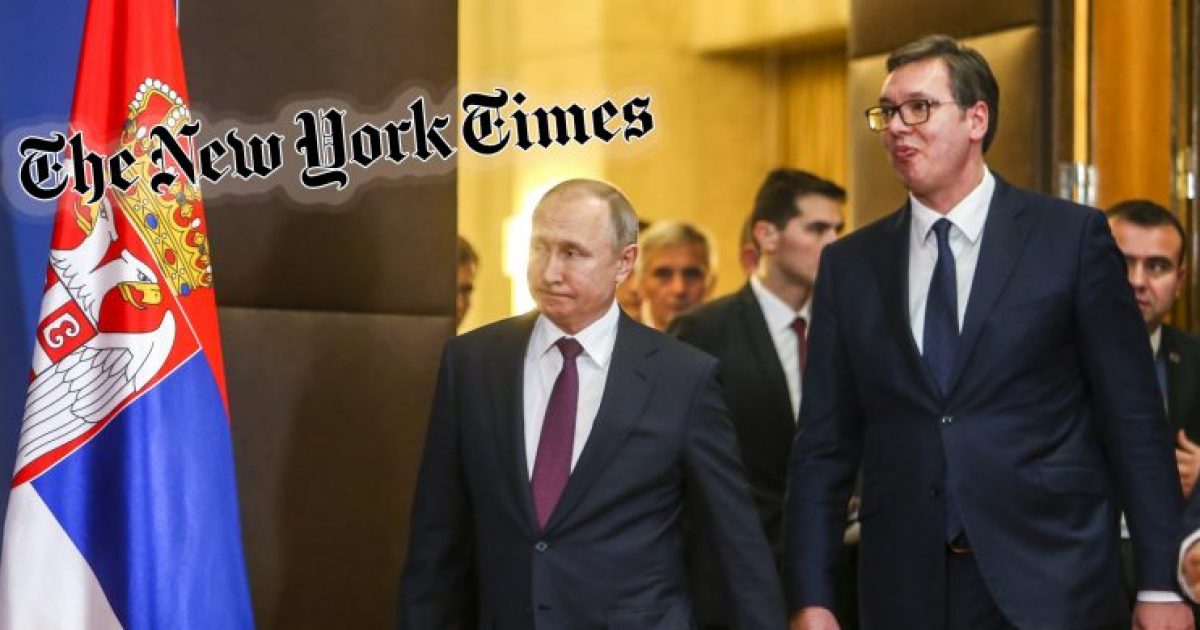Serbian President Aleksandar Vucic's ties to Moscow have raised questions as the Kremlin appears to be fomenting unrest in the Balkans to divert attention from the war in Ukraine, writes the New York Times, adding that Vucic is tired of being called "Little Putin" as some accuse him of allegedly intending to commit aggression against his neighbors in the Balkans.
First, according to the
New York Times
, Vučić ironically said in the library of the presidential palace that "I am almost two meters tall", alluding to the comparison of his height with the Russian president, Vladimir Putin.
However, as the New York Times notes, following Vucic's comment about his physical stature, there is a serious question troubling the Balkans and preoccupying Western diplomats: Is Russia, mired in a brutal war in Ukraine, using Serbia to foment division in Europe and ignite a renewed conflict in the former Yugoslavia to distract NATO from the battle raging in the east?
That fear was sparked after Kosovo's decision to implement the license plate agreement between Serbia and Kosovo, which sparked protests, roadblocks and gunfire - setting off alarm bells in the NATO alliance, the paper said.
"Unrest in Kosovo and tensions in Bosnia and Herzegovina caused by Milorad Dodik, the Moscow-backed leader, and hard-line Croatian nationalists have sent a warning that Russia is quietly trying to stoke the tensions of the wars of the 1990s." it says in the text.
As the New York Times writes, Russian news media and social media accounts have been publishing inflammatory reports for months about Serbs in Kosovo and Bosnia that their basic rights are being violated.
The reports, which largely repeat Russian propaganda about the suffering of ethnic Russians living in Ukraine, have emboldened hardline, pro-Moscow Serbian nationalists, the newspaper added.
Slavisha Ristić, the former mayor of Zubin Potok, a town in northern Kosovo that is almost entirely populated by ethnic Serbs, said she would never voluntarily put Kosovo license plates on her car because that would mean recognizing Kosovo's independence. something that is almost certain for all Serbs, including the president, Vucic.
Borko Stefanovic, vice-president of the opposition Party for Freedom and Justice, who chairs the Serbian Parliament's foreign affairs committee, said the license plate issue is "so small that it is absolutely ridiculous".
"But", he added, "here in the Balkans, such symbolic things have great importance".
A senior member of Vučić's party, Vladimir Djukanović, had declared that "Vučić will be forced to begin the denazification of the Balkans," an ominous echo of Russia's stated goal in Ukraine and Belgrade of a "Greater Serbia." writes the newspaper.
The New York Times recalls how Putin has repeatedly cited NATO's military intervention in support of Serbia's 1999 halt to killings in Kosovo as a justification for Russia's aggression against Ukraine, which he claims is to protect Russians. ethnic groups in Donetsk and Luhansk.
Most Western countries recognize Kosovo as an independent state, unlike Serbia, Russia, China and five European countries.
Vučić said he had nothing to do with recent license plate protests in northern Kosovo, saying ethnic Serbs there were "100 percent fed up," especially with the Kosovo government's refusal to implement key parts of the 2013 agreement. -s.
The war in Ukraine, according to Vucic, has left the country between dependence on Russia for energy and diplomatic support over Kosovo and demands from Western powers to join efforts to punish Moscow for its occupation of Ukraine.
"Every day I have pressure from them to impose sanctions on Russia," said Vucic.
That, he added, won't happen, at least not until Serbia's stalled 13-year application to join the European bloc is expedited.
More than 80 percent of Serbs oppose sanctions against Russia, according to a recent public opinion poll, the New York Times points out.
Serbia's refusal to implement the sanctions has given them reason to see Vucic as a Russian puppet.
Noting that Serbia "remains the only country in Europe that refuses to sanction Russia," Kosovo Prime Minister Albin Kurti called Vucic "Serbia's Little Putin" in April.
"Peace and security in the Western Balkans have never been more threatened," he said.
Vucic rejected Kurti's accusations.
"Kurti wants to be 'little Zelensky' fighting against 'little Putin,'" Vucic said, referring to Ukrainian President Volodymyr Zelensky.
/Telegraph/
